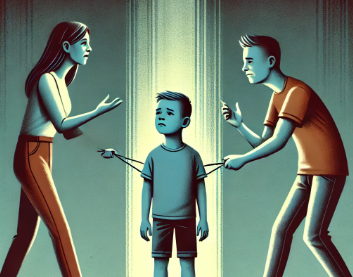What are FAP or Parental Alienation Syndrome?

Parental Alienation Syndrome (SAP) is a family disorder that occurs when after a conflictive marital breakup, parents engage in battle by . This results in the children rejecting one of the two, usually the father. If a judicial figure also intervenes, the problem tends to get worse.
The PAS concept has been questioned for various reasons, firstly because it does not meet the requirements to be called a “syndrome” and because it gives rise to partiality (victim-executioner) when in reality the dysfunctional actions are committed by both parents. That is why in recent years the SAP has been renamed PAF, Family Alienating Practices. They are considered a serious form of child and adolescent abuse.
Triangulation and PAF
FAP is especially difficult to combat because it falls between the parental and conjugal realms.
- The parenting it is the way in which they exercise parental functions.
- The conjugality it is the way the couple relates to each other.
FAP occurs when there are serious marital problems and preserved parenting. Parents with a problematic relationship, despite being committed to the well-being of their children, may end up involving them as allies in the fight to “win” the conflicts that confront them. This produces what in psychology we call triangulation. The complexity and severity of triangulation generates neurotic and psychotic pictures of different types and degrees in children.
Is there a good and a bad?
To understand this problem well, we cannot put it in good-bad terms. Both parents have an implication in the problem, therefore, we must talk about co-responsibility. There is no good parent and no bad parent, but successful manipulator (the alienator) and failed manipulator (the alienated). We must also add that when it occurs, it is not really one hundred percent broken, because there are still ties that unite them, the children. This is called postmarital and it can be harmonic or disharmonic.
The alienated child
It is understood by alienated child to the one who freely and persistently expresses negative feelings towards a parent in a disproportionate way taking into account his actions. After the conflictive separation, the son, seized by the fear of being between two open fires, flees by aligning himself on one side. He does not need to be manipulated by one of the two, since he knows how to discern who suits him to satisfy his needs, for example, if one of the parents is very authoritarian or cold, the child will tend to go with the other.
Prevent the child from rejecting one of the parents
The first thing is to always keep in mind the bases of the responsible parenthood: commitment, involvement, accessibility, validation, tenderness, cooperation with the other parent, material contribution for what is necessary and influence on decisions about parenting. La (not necessarily together) is essential both to mitigate the consequences of this type of abuse and to find alternative solutions.
- After a conflictive marital breakup, in which the parents engage in a battle for possession of the children, they lead the children to reject one of the two.
- Active and direct manipulation is not required to take sides against one of the parents. Children know how to discern who suits them.
Editorial Team: Specialist in Clinical Psychology.
(Updated at Feb 27 / 2025)